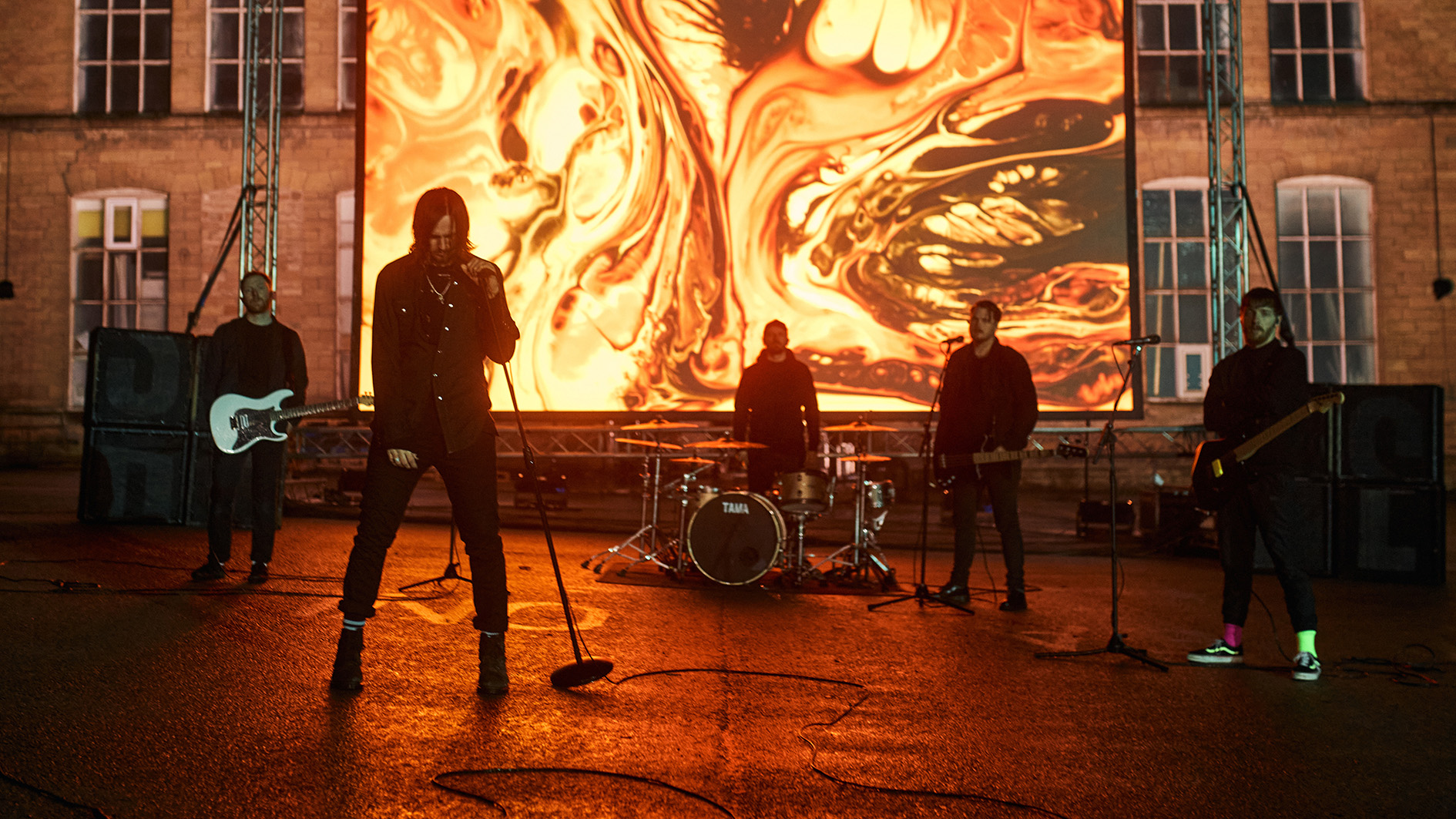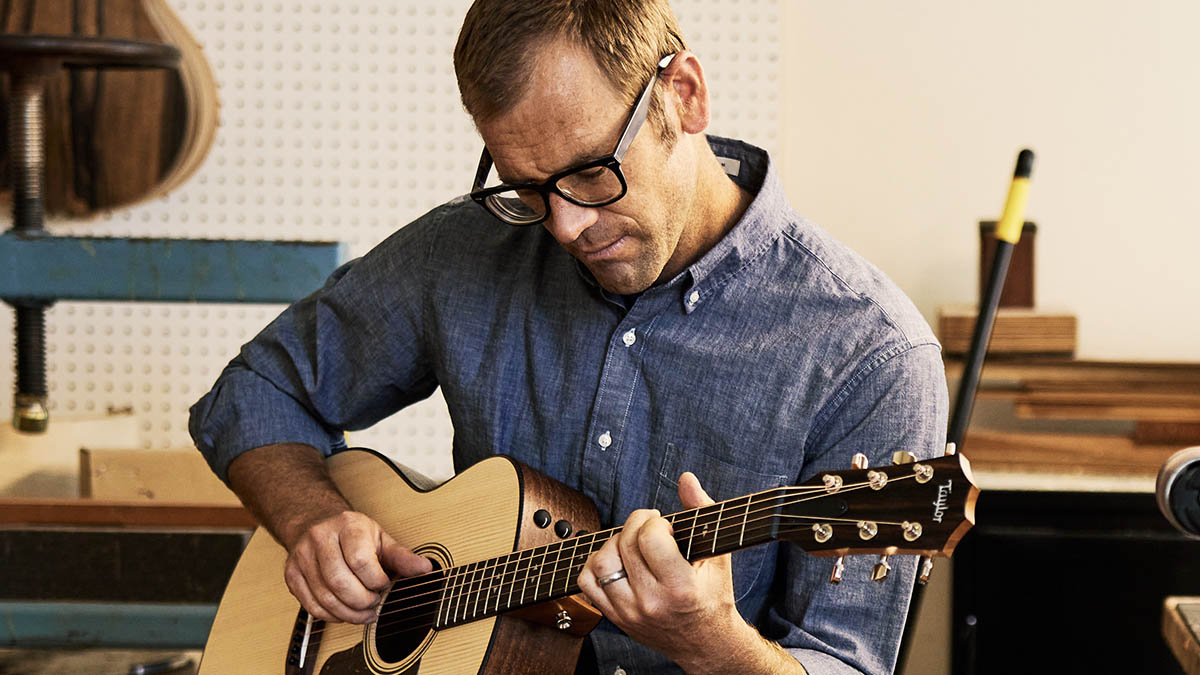While She Sleeps on why they've gone DIY: “People in the music industry have never picked up a guitar or written a song but they have the big opinions”
Guitarists Sean Long and Mat Welsh dive deep on ditching management with their star-studded new album, Sleeps Society
![[L-R] Sean Long and Mat Welsh of While She Sleeps](https://cdn.mos.cms.futurecdn.net/qSnKKxvKcNvwZNnz4B4hR3.jpg)
A lot of bands talk about going down the DIY route, but few have taken it as far as Sheffield metalcore bruisers While She Sleeps. For this year’s fifth studio album Sleeps Society, which is being released via their own label imprint Sleeps Brothers, they’re taking matters into their own hands – with no management backing whatsoever.
Instead, 14 years into their career, they’ve created their own network – Sleeps Society – offering fans the chance to pledge their support in return for exclusive content and experiences that will bridge the gap between their creative processes and those who want to be part of the journey.
From guitar tutorials and play-throughs to secret shows and live-streams that will allow fans to have their own input on where the music goes next, the idea is to fund the group directly instead of relying on what they refer to as “obsolete” business models to sustain the five members and how they navigate a world brimming with other noises.
In many ways, it all goes back to the punk ethos that cemented their love for music...
“As our career’s progressed, I feel like the more we’ve learned, the more curtains we’ve pulled back to realize there are so many things we could have been doing ourselves,” says lead guitarist Sean Long, while waiting for rhythm man Mat Welsh to log into the Zoom conference.
“After each album, we’ve learned a little more. This time round, we have no manager – so that’s a big difference – but we’ve always kinda managed ourselves in the main areas we need to anyway. We did You Are We, two albums ago, with no label but with management. This time we’re doing distribution and have no management. Any opportunity we get to do things ourselves we take.
“We’re just a bunch of fuckin’ punks to be honest...”
All the latest guitar news, interviews, lessons, reviews, deals and more, direct to your inbox!

“The mistakes happen when you take something you care about and give it to someone else to look after,” agrees Mat, when he joins us a few moments later. “That’s why we’ve started to operate more and more independently.
“At least if we fuck it up, it’s our problem. I can’t drop too heavyweight a name because it only gets me in trouble, and I get in enough trouble in the press, but it boils down to finances.
“The whole industry is happy to constantly speculate to accumulate, treating artists like products. Whether it’s an agent or manager – if they could put you on tour and ensure there was a gig every day that year, they would. They see it as the best chance of your band succeeding and them making money. But what that actually does is kill the band.”
In what other ways does it feel like the music industry has failed you?
Long: “I’m not saying we don’t need help in certain areas, of course we do, but there are limitations to what artists perceive they can do themselves. We were brought up to believe you need all these things to make anything possible. And we’ve learned that a lot of the time that’s not actually true.
“Now we like doing it alone almost to prove a point to ourselves – and a lot of the things we sing about are self-belief. It goes hand-in-hand for us to see what we can do for ourselves and remain successful instead of going independent with no manager and the band suffering as a result. We want to try it the opposite way round, do it ourselves and become even more successful.”
One reason why a lot of young artists don’t make it is that there are a lot of people in the music industry who don’t give a shit. They have no connection whatsoever, it’s just another job for them
Sean Long
Welsh: “There are so many examples out there, where bands have been encouraged to do things that aren’t, from a personal standpoint, looking out for their mental wellbeing. It’s all about telling you to keep working.
“Take the charts, for example. Management will do everything they can to get those last sales in to reach that high number – because it applies to their bragging rights. They would happily risk spreading the band too thin.
“You can work your head off and end up in dangerous situations where people are encouraging you to do what’s best for them, not you. Now, everything is our decision and we can analyze if it’s healthy for us to do and in the band’s best interests.”
There definitely seems to be a trend of younger bands who look like they’re on the brink of success deciding to call it a day prematurely…
Long: “Exactly. One reason why a lot of young artists don’t make it is that there are a lot of people in the music industry who don’t give a shit. They have no connection whatsoever, it’s just another job for them. When things go wrong financially, it’s due to the fact that the people around the band don’t care enough if it fails. It doesn’t affect them personally, it only affects the band.
“That’s why we wanted to do it ourselves – if we drop the baby, it’s our baby to drop! A lot of times people talk about touring or life as a band, but they’ve never toured a day in their life. They’ve never picked up a guitar or written a song but they have the big opinions.”
So, in that regard, it’s a combination of industry personnel not really understanding how musicians live, as well as being less invested if things don’t work out...
Long: “So many times in our career, an opportunity has presented itself and we’re told we need to take it because it’s so important. But it never stops. Say you’ve just done an eight-week tour and you’ve just gotten home, trying to regroup and relax, and then another opportunity comes up.
“And you have the fear of missing out, so you take it and it’s a chain reaction. You keep taking opportunities thinking they’ll never come again… but they will come again. We’ve learned this from being driven into the ground physically and mentally so many times, trying to recoup debt or whatever.
“We’re the ones on the ground, physically doing the work, touring and not sleeping for two weeks straight, spending money to make this happen. That gets lost in translation within the industry. It’s not like the industry is always bad, but it can seem bad from an artist perspective. We do the groundwork and they’re not.”
Welsh: “The studio is a good example, as well. It’s so easy for someone to say, ‘Yeah just get in there and knock it out in a month, keep it raw!’ and it doesn't work like that. Every band is different. It’s so easy for someone outside the band to have this model or formula… but it won’t apply to everyone. Different bands take different amounts of time to do different things.”
Going through the standard rock band model doesn’t necessarily mean it’s right for you. That’s why we’re doing what we are
Mat Welsh
There’s no one-size-fits-all when it comes to creativity and getting yourselves heard...
Welsh: “If you consider music as an artform, everyone works differently – from recording to touring. Going through the standard rock band model doesn’t necessarily mean it’s right for you. That’s why we’re doing what we are.
“It’s not because the industry is evil or wrong, we’re just trying to design our career as creatives. We don’t want this band to hit a brick wall in a few years, which is what could happen if we tried fitting inside boxes we don’t fit in.
“It would drive us crazy and people in the band might say, ‘Fuck this!’ Doing it our own way means hopefully we’ll live a lot longer.”
Fingers crossed! So what can you tell us about the sounds we’re hearing on Sleeps Society?
Long: “The main riff tones for 80% of the songs was through a 6505+ as well as Marshall JCM800 and JVM205. There was also a Mesa Dual Rec in there too, and they were all used in different dynamic ways throughout each song. It would always change – we might bring the 800 up or add in a Tube Screamer.
“It would depend on the riff and what kind of tone would suit the picking. On this album I found myself turning off the Tube Screamer, trying to get the best tone I can without adding any more in terms of gain – because the pickups are hot and the amp is already very high gain...”
Well, as they often say, less is more!
Long: “The more distortion you dial in, even though it might sound good, you end up watering down the clarity of your riffs. That’s also why sometimes I don’t like stacking too many guitars on top of each other. It makes sense for choruses, but for the more riffy parts, it’s better to keep it a bit more open-sounding but still fat.
“You want all the dynamics in your picking to come out, rather than get covered up by gain. I used a Charvel, I can’t remember the name of it, but it’s a Strat-looking one fitted with EMG 57/66s. That was the bulk of my tone.”
Welsh: “All those amps are plugged in all of the time and then we have this thing called an Ampete, which is a really high quality switcher made by this guy in Germany. He builds this beautiful little rack-mounted thing that lets you can have up to eight cabs and eight heads connected.
“We just had one cab – mic’d up really nice with a whole spent getting it in-phase. And then for each section, we’ll punch through all the different amps at the click of a button and choose which best suits the part. It’s a bit like having an analog Kemper [laughs]! Everything is catered for each section of the song and what makes it sound best.”
And what guitars were you using, Mat?
Welsh: “My department is the sprinkles department. All the riff stuff is Sean, but when it comes to choruses I often stack a low-gain, jangly, open chordal thing that almost sounds like Oasis or Foo Fighters. I use an array of different things for those parts.
I really like pedals that add something when you turn them on, even if you’re using them with no effect or gain dialed in
Sean Long
“I actually missed one of the amps earlier, we also used an AC-30 head for ashtray clean kind of tones. It’s clean but it can barely contain itself… a grubby clean. I’ve got a ‘69 Telecaster reissue with stock pickups that we used for a lot of the single-coil donkey breakdowns.
“Most of the main guitars I play have a Seymour Duncan Invader. I’ve also got an Ibanez AZ hollowbody which I use, and that has stock pickups that are closer to PAF output…”
Long: “That’s why I liked the EMG 57/66 set, it’s more of a retro take on active.”
It definitely sounds like there’s a lot of pitch-shifting going on at points...
Long: “I really like pedals that add something when you turn them on, even if you’re using them with no effect or gain dialed in. I do that with my Whammy pedal a lot. I don’t know if mine is broken, but you can turn it on and not use any of the octave effects.
“But it gives you this slightly different tone… it’s probably a mistake that most guitarists wouldn’t want but hopefully gives it a tone that fans will recognize as me. It gives it something different, a strange brokenness.”
Welsh: “It’s almost like a phasing thing, like when you have a coil-tap on your guitar and it throws your pickups in the opposite phase.”
Sean: “A few years ago I nearly got rid of it, wondering why my pedal was broken. But I’ve started to really like that mistake. I can’t live without it now. And I do other things like play my parts an octave down and then use the Whammy to bring it back to pitch. Technically it’s the same, but because it’s going through the Whammy, I love how it all gets crushed up. That’s my jam!”
Welsh: “We also had the DigiTech Drop pedal, which got used a lot. And we had this MXR Slash pedal for dirty octaves, plus the Strymon Big Sky on a lot of the leads. And lots of wah… always.”

Deryck Whibley from Sum 41 guests on the track No Defeat For The Brave. How did the collaboration come about?
Long: “It will never sink in… it’s almost too surreal. When I first got into the alternative scene, I was actually skateboarding before I was playing guitar. Blink-182 and Sum 41 were the first groups I was listening to.
“Me and our bass player took a lot of inspiration from Sum 41 because all they seemed to do on their documentary was fuck about and film stupid shit.
“Unbeknownst to me, Mat was doing the same thing with another bunch of friends at the same time. We’d film ourselves round our village falling out of bushes, rolling down floors, just doing stupid things and the backing music we chose was Sum 41.
“Then I put them to bed for a while and got into metal. It was only in my mid-20s I realized how much Sum 41 influenced my life. It’s in me somehow. I can’t believe how similar our band is to Sum 41 at times, we’re like a heavy version of that band. We were burning Chuck at school…”
Welsh: “Chuck’s the one! You’d never think we sound similar, but honestly if you listen to that album and what we do, you can hear the subconscious influence. I can see why Deryck was up for singing on this, because it’s like his band but in a different dimension or space.
“We found a way of asking him through some friends and it blew our minds when he said he was a massive fan and would love to get involved. That’s why we sent him the song in full and said, ‘Sing and add whatever you want!’ It was more of collaboration than a feature. He’s there... literally in our band for that one song rather than just two bars in the middle.”
- Sleeps Society is out on April 16, and available to preorder now.
Amit has been writing for titles like Total Guitar, MusicRadar and Guitar World for over a decade and counts Richie Kotzen, Guthrie Govan and Jeff Beck among his primary influences as a guitar player. He's worked for magazines like Kerrang!, Metal Hammer, Classic Rock, Prog, Record Collector, Planet Rock, Rhythm and Bass Player, as well as newspapers like Metro and The Independent, interviewing everyone from Ozzy Osbourne and Lemmy to Slash and Jimmy Page, and once even traded solos with a member of Slayer on a track released internationally. As a session guitarist, he's played alongside members of Judas Priest and Uriah Heep in London ensemble Metalworks, as well as handled lead guitars for legends like Glen Matlock (Sex Pistols, The Faces) and Stu Hamm (Steve Vai, Joe Satriani, G3).

